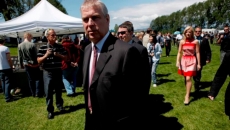VICTORIA - Health Minister Jean-Yves Duclos says the federal government has been working with provinces to restore the country's ailing health systems throughout the pandemic, despite claims to the contrary from Canada's premiers.
Great way to kick off a tour of Atlantic Canada! Thank you to my provincial counterpart @MThompsonPC for a productive 1st in-person meeting to discuss shared priorities, NS’s unique health challenges and ways to continue working together to improve health care for Nova Scotians. pic.twitter.com/7lfSU98FrK
— Jean-Yves Duclos (@jyduclos) July 12, 2022
The comments come as premiers meet for a second day of talks in Victoria that have been dominated by the health-care crisis across the country.
B.C. Premier John Horgan, who chairs the Council of the Federation comprising all the premiers, said the health-care system needs to be reimagined with a plan for sustainable human resources and stable federal funding.
He said it's been eight months since the federal government promised to sit down with the premiers to come up with a strategy to restore the health-care system and that meeting is overdue.
Duclos said the federal government recognizes all provincial health systems are in crisis, mainly driven by a shortage of health workers.
"Many workers have left the profession during COVID-19 because of the physical and mental-health toll that COVID-19 brought to them and their families," Duclos said in an interview Tuesday.
"Provinces and territories legitimately feel that crisis because they are most directly impacted by the health-care crisis that we're all seeing across the country."
Duclos said he's been working steadily with his provincial counterparts on the issue, while also transferring billions of dollars to provinces to shore up the system during the COVID-19 pandemic.
"We have stepped up together in terms of policy but also in terms of funding to support the provinces," he said, adding that the federal government has already agreed to do more over the long term.
On Monday, the premiers called on the federal government to boost its share of health-care funding to 35 per cent from the existing 22 per cent amid staffing shortages.
Duclos did not offer a timeline for the federal government to engage in those negotiations. Previously, Prime Minister Justin Trudeau has said those conversations will happen when the pandemic has passed.
Currently, federal contributions to provincial health systems grow in line with a three-year moving average of nominal gross domestic product.
Based on that formula, the health transfer payment to provinces increased by 4.8 per cent in the most recent federation budget, amounting to an extra $12 billion projected over the next five years compared to pre-pandemic estimates.
Affordability issues and economic recovery are among the other topics on the table during the Council of the Federation's summer meetings, which wrap up Tuesday.
Horgan says the premiers are also sharing ideas for combating inflation and skyrocketing costs of living, and they hope to see significant federal support in that arena as well.
"The ideas in Quebec are as valid there as they are in British Columbia," Horgan said Monday.
While some of the causes are global, like the COVID-19 pandemic and Russian aggression in Ukraine, the impacts are local and require sustained intervention, he said.
"These are seismic issues that are rocking the international economy and we're not immune to that. But collectively, working together to find best practices — what can we do in our respective jurisdictions — and most importantly how can we collaborate with the federal government on meeting these challenges."






